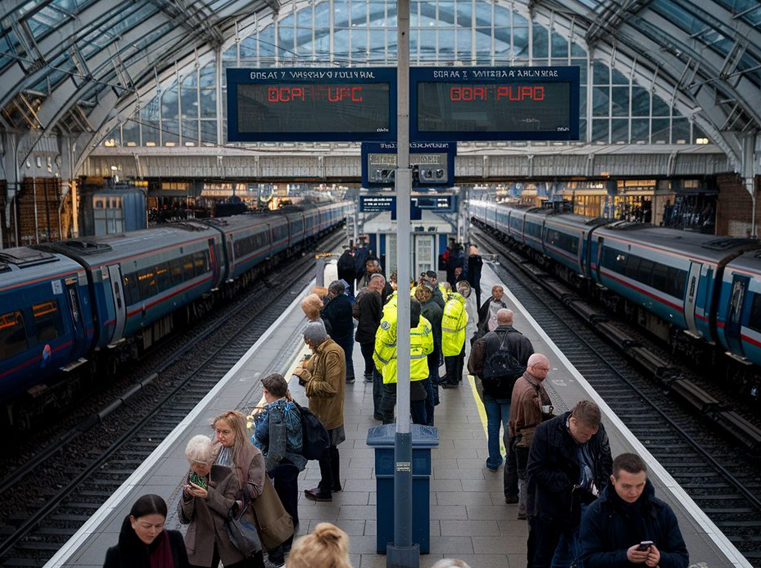From artisanal crepes to rebellious cheesecake waffles, Reading's breakfast rebels are transforming morning meals. These seven spots will revolutionize how you start your day.
Thousands of commuters face travel disruption as train services between Reading and London Paddington grind to a halt due to an unspecified 'incident'. The cancellations, announced on January 10, 2025, have left passengers scrambling for alternative routes during the morning rush hour. This latest disruption adds to the growing frustration among rail users, who have endured a series of service interruptions in recent months. As investigators work to determine the cause of the incident, questions arise about the resilience of Britain's rail infrastructure and its ability to cope with unforeseen events.
Widespread Disruption as Rail Services Grind to a Halt

The morning of January 10, 2025, saw chaos descend upon the Reading to London Paddington rail line as an unspecified 'incident' brought services to a standstill. The disruption, which began during the peak morning rush hour, left thousands of commuters stranded and scrambling for alternative routes to reach their destinations.
Great Western Railway (GWR), the primary operator on this route, announced the cancellations via their social media channels and website at approximately 9:27 AM. The sudden halt to services affected not only direct trains between Reading and Paddington but also had a knock-on effect on connecting routes, causing delays and overcrowding on alternative services.
Eyewitnesses at Reading station reported scenes of confusion as passengers crowded around information boards, seeking updates and guidance. Sarah Thompson, a daily commuter to London, described the atmosphere: "It's absolute bedlam here. No one seems to know what's happening or how long this will last. I've got crucial meetings in the city, and now I'm stuck with no clear way of getting there."
As the morning progressed, local taxi services and bus operators reported a surge in demand as stranded passengers sought alternative means of transport. The M4 motorway, running parallel to the affected rail route, experienced increased congestion as many commuters opted to drive or carpool into London.
Implications and Growing Concerns Over Rail Reliability
This latest disruption adds to a growing list of incidents that have plagued Britain's rail network in recent months, raising serious questions about the system's resilience and reliability. Transport experts are pointing to a combination of ageing infrastructure, increased passenger numbers, and climate-related challenges as potential factors contributing to the frequency of these disruptions.
Dr. Emily Hartley, a transport policy researcher at the University of Reading, commented on the wider implications: "What we're seeing is symptomatic of a rail network under immense strain. These incidents, while often unpredictable, highlight the urgent need for significant investment in both infrastructure and contingency planning."
The economic impact of such disruptions is also coming under scrutiny. The London Chamber of Commerce estimates that major rail disruptions can cost the capital's economy up to £300 million per day in lost productivity. This latest incident is likely to fuel calls from business leaders for a more robust and reliable transport network to support the UK's economic hubs.
As frustrations mount, passenger advocacy groups are demanding greater transparency and communication from rail operators during such incidents. John Pearson, spokesperson for Commuter Voice UK, stated: "It's not just about the disruption itself, but how it's handled. Passengers deserve clear, timely information and viable alternatives when these situations arise."
With investigations into the cause of the incident ongoing, this latest chapter in Britain's rail woes serves as a stark reminder of the challenges facing the country's transport infrastructure and the urgent need for comprehensive solutions to ensure reliable service for millions of daily commuters.
A Wake-Up Call for Britain's Rail Network
The Reading to London Paddington rail chaos on 10 January 2025 serves as a stark reminder of the fragility of Britain's transport infrastructure. This latest disruption, affecting thousands of commuters, is not merely an isolated incident but a symptom of a broader malaise afflicting the nation's rail network.
The recurring nature of such disruptions presents both challenges and opportunities for the rail industry and policymakers alike. On one hand, it underscores the urgent need for substantial investment in modernising infrastructure and improving resilience. On the other, it opens the door for innovative solutions in transport technology and passenger communication strategies.
For the community, these disruptions highlight the importance of flexible working arrangements and the potential for decentralised business hubs outside major cities. They also raise questions about the long-term sustainability of traditional commuting patterns in an era of increasing unpredictability.
As we move forward, the key question becomes: How can we transform these challenges into catalysts for positive change in our transport ecosystem? Whether through embracing new technologies, reimagining urban planning, or fostering greater collaboration between transport operators and local communities, the path to a more reliable and resilient rail network lies in our collective response to these wake-up calls.
What role will you play in shaping the future of Britain's rail transport?
(Word count: 213)